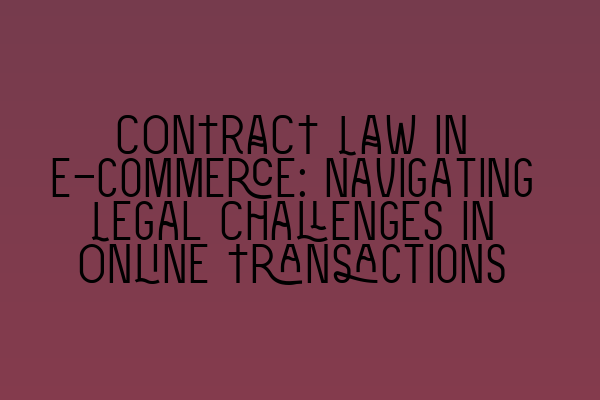CONTRACT LAW in E-commerce: Navigating Legal Challenges in Online Transactions
In the fast-paced world of e-commerce, establishing and maintaining a solid contract is crucial for ensuring a smooth and legally sound online transaction. Whether you are a business owner running an online store or a consumer making a purchase online, understanding contract law in the context of e-commerce is essential to protect your rights and to avoid unnecessary disputes. In this blog post, we will explore some of the key legal challenges that arise in online transactions and provide practical tips on how to navigate them effectively.
One of the first questions that often arises in the realm of e-commerce is whether a legally binding contract is formed in an online transaction. The answer is usually yes, as long as the basic elements of a contract are present: an offer, acceptance, consideration, and an intention to create legal relations. In the online context, these elements can be established through a series of clicks, such as selecting items, adding them to the cart, providing payment information, and clicking “confirm” or “place order.” It’s important to note that the terms and conditions of the transaction, including any disclaimers, refunds, and dispute resolution clauses, should be clearly communicated and accepted by both parties.
To ensure that your online contracts are legally enforceable, it is advisable to include clear terms and conditions that outline the rights and obligations of both parties. This can help prevent misunderstandings and minimize disputes. Make sure your terms and conditions are easily accessible on your website and provide a clear and concise summary of the key provisions. If you are a consumer, it is important to review and understand these terms before making a purchase. If any of the terms are unfair or unreasonable, consider seeking legal advice or engaging with an alternative seller or provider.
When it comes to online transactions, issues of data protection and privacy are of utmost importance. GDPR (General Data Protection Regulation) compliance is a mandatory requirement for all businesses handling personal data within the European Union. As an e-commerce business, you must ensure that you have appropriate data protection policies and procedures in place, and that you obtain the necessary consent from users before collecting and processing their personal information. Failure to comply with GDPR can result in severe penalties, so it is critical to stay informed and up to date with data protection regulations.
In addition to data protection, ensuring the security of online transactions is equally vital. Implementing secure payment gateways, encryption protocols, and using trusted third-party platforms can help safeguard sensitive customer information. It is also important to have clear refund and returns policies, as well as procedures for handling disputed transactions. These measures not only protect your customers but also help establish trust and credibility for your business.
As e-commerce continues to grow rapidly, cross-border transactions have become increasingly common. This presents unique challenges in terms of jurisdiction and applicable laws. When engaging in cross-border e-commerce, it is crucial to consider the laws of the countries involved, including consumer protection regulations, contract laws, and dispute resolution mechanisms. Seeking legal advice specific to the jurisdiction can help ensure compliance and mitigate potential risks.
In conclusion, navigating legal challenges in e-commerce requires a thorough understanding of contract law and its application in the online context. By establishing clear and enforceable contracts, complying with data protection regulations, ensuring transaction security, and considering the complexities of cross-border transactions, you can protect your rights and interests in the ever-changing world of e-commerce.
For more practice in contract law and other areas of legal expertise, check out our SQE 1 Practice Exam Questions and enhance your knowledge with our SQE 1 Practice Mocks FLK1 FLK2. To prepare for the SQE exams, explore our comprehensive SQE 2 Preparation Courses and SQE 1 Preparation Courses. Stay updated with the latest SRA SQE Exam Dates to plan your exam schedule.
Remember, it is always advisable to consult with a qualified legal professional to address your specific concerns and ensure compliance with the applicable laws and regulations in your jurisdiction.
